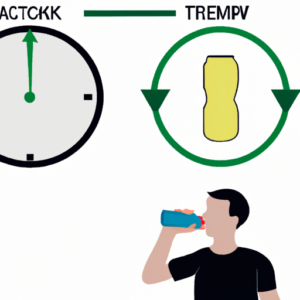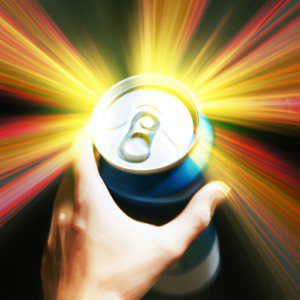Energy drinks have become an increasingly popular choice for those seeking a quick, easy source of energy. However, the ingredients in these beverages are often not well understood or appreciated by consumers.
This article takes an in-depth look at some of the common ingredients found in energy drinks and explores their potential impact on health. The primary aim is to provide readers with a better understanding of what they’re putting into their bodies when they consume these products.
We will examine how each ingredient works, as well as its potential beneficial or detrimental effects on overall health. After reading this article, you should be able to make more informed decisions about your consumption habits regarding energy drinks.
Caffeine: The Most Common Ingredient
Time immemorial, caffeine has been a popular source of energy and is the most common ingredient found in energy drinks. Caffeine can be derived from coffee beans, tea leaves, kola nuts, yerba mate and guarana berries. It acts as a stimulant on the central nervous system by increasing levels of dopamine in the brain.
The effects of consuming caffeine vary depending on an individual’s body weight, age and tolerance to caffeine-containing beverages. Generally speaking, it may cause increased alertness and improved mental focus. In addition to this, it increases heart rate, respiration and metabolism which could lead to enhanced physical performance during activities such as exercise or sports competition.
Studies suggest that moderate consumption of caffeinated beverages can provide health benefits but larger quantities often produce adverse side effects like headaches, restlessness and insomnia. People with underlying medical conditions should consult their healthcare providers before drinking caffeinated beverages including energy drinks due to possible interactions with medications they are taking already.
Taurine: The Mysterious Amino Acid
Taurine is an amino acid that has been gaining notoriety as a popular ingredient in energy drinks. Its mysterious and unfamiliar nature has caused many to question its safety when consumed in large quantities.
While the exact mechanism of action of taurine is not currently known, it appears to have several metabolic effects due to its sulfur content. The presence of sulfur allows taurine to interact with other molecules inside cells and increase the production of certain hormones and enzymes. This can lead to greater absorption of nutrients from food and improved cellular processes such as respiration and metabolism. Some studies suggest that this may result in increased energy levels, though further research is needed to confirm these findings.
While there are some positive potential effects associated with taurine consumption, it should be noted that consuming too much could potentially be harmful for individuals who already have existing health concerns or take medications which interact with taurine. As such, caution must be taken when considering adding high amounts of taurine-containing products into one’s diet. Ultimately, more research needs to be done on the long-term effects of regular ingestion before any definitive conclusions can be made about its safety.
Guarana: A Source Of Natural Caffeine
Guarana is a fruit native to the Amazon region known for its medicinal properties and high caffeine content. It has long been used as an ingredient in energy drinks, due to its stimulating effects. As such, it can provide numerous health benefits if consumed responsibly.
One of the key components of guarana is guaranine; this compound is chemically similar to caffeine and provides many of the same beneficial effects on mental alertness and physical performance when ingested. The primary difference between these two compounds is that guaranine does not cause the jittery side-effects often associated with high doses of caffeine. This makes guarana a safer alternative for those seeking increased energy without potential negative consequences from excessive consumption.
The antioxidant properties found within guarana are also highly beneficial; they help fight off free radicals which can damage cells over time.
Furthermore, studies have indicated that consuming small amounts of guarana may improve cognitive function, reduce inflammation, suppress appetite, and even aid in weight loss efforts.
B Vitamins: Boosting Your Energy Levels
1. B-vitamins are essential for maintaining energy levels, as they assist in the metabolism of carbohydrates and the formation of red blood cells.
2. B-vitamins can be found in a variety of foods, including nuts, seeds, eggs, poultry, fortified cereals and dairy products.
3. Supplementation can also be beneficial for those who are unable to consume enough B-vitamins from their diet.
4. It is important to note that while some energy drinks contain B-vitamins, they can also contain other ingredients that may not be beneficial to overall health.
Benefits Of B-Vitamins
The body requires B-vitamins for different metabolic and physiological processes. Vitamins of the B complex family are found in a variety of sources, from fortified food items to enriched grains as well as dietary supplements. A daily intake of these vitamins is essential for keeping energy levels up throughout the day.
B-vitamins provide several benefits that help boost energy levels. The vitamins act as coenzymes and facilitate numerous reactions within the body’s cells which helps with metabolism, including those related to energy production and storage.
B-complex vitamins also play an important role in other bodily functions such as digestion and nervous system functioning, both of which contribute to how energized one feels on a daily basis.
Overall, having adequate amounts of B-vitamins in your diet can do wonders when it comes to increasing energy levels so you can feel more alert and alive during the day. Therefore, incorporating nutritionally rich foods into your diet or taking vitamin complexes may be beneficial for improving overall health and wellbeing.
Sources Of B-Vitamins
In order to ensure an adequate intake of B-vitamins for the purpose of increased energy levels, it is important to understand where these vitamins can be sourced from.
Generally speaking, B-complex vitamins are found in a variety of food items such as fortified grains and cereals, dairy products, eggs, legumes and nuts. Additionally, many processed foods contain enriched or added ingredients that include various B-vitamins which may help increase daily intake.
Dietary supplements containing all eight of the essential B-vitamins are also available over the counter and provide convenient solutions to those who prefer not to eat particular food sources mentioned above.
It is possible to become deficient in certain types of B-vitamin due to inadequate dietary consumption or poor absorption during digestion. A vitamin deficiency can lead to a number of adverse symptoms including fatigue and general feelings of lethargy; this makes it even more critical for individuals at risk of developing deficiencies to make sure they receive enough Vitamin B through their diet or supplementation.
As such, having sufficient amounts of Vitamin B on hand will give your body access to its necessary energy sources needed for optimal functioning throughout the day.
Adequate amounts of Vitamin B should be taken into account when creating a balanced diet plan rich in nutritional value and nutrient dense foods so you can stay energized and healthy each day.
Sugars And Sweeteners: Added For Taste
Energy drinks often include added sugars and sweeteners to provide a more palatable taste. Commonly used artificial sweeteners in energy drinks are aspartame, sucralose, and saccharin. Aspartame is an artificial sweetener found in many food products including diet sodas due to its low calorie content; however, some research has suggested that it may be linked with certain diseases such as cancer or neurological disorders.
Sucralose is another popular sugar substitute which is about 600 times sweeter than table sugar but does not contain any calories. Saccharin is the oldest form of artificial sweetener on the market and can have a bitter aftertaste when consumed. Although these ingredients can improve the flavor of energy drinks, there are potential risks associated with consuming them regularly over time.
Artificial sweeteners may cause gastrointestinal discomfort and reactions such as bloating or flatulence for some people. In addition, it is important to note that consumption of large amounts of sugar substitutes could lead to weight gain if other dietary changes are not made accordingly. Furthermore, excessive intake of energy drinks containing sugar substitutes may increase risk factors for type 2 diabetes and cardiovascular disease due to their high-calorie contents.
In light of this knowledge, it is essential for consumers to understand how much sugar they are ingesting from energy drinks before making a decision whether or not to purchase them. It is also important that individuals consider the long-term health implications associated with frequent consumption of artificially sweetened beverages in order to make informed decisions regarding their own well-being.
Frequently Asked Questions
Are Energy Drinks Safe To Consume On A Regular Basis?
As the saying goes, ‘too much of something is never a good thing’. This could not be more true when it comes to energy drinks, as regular consumption may present potential health risks due to their high caffeine content and sugar levels.
While these beverages can provide an immediate boost in energy, they are not intended for daily use or recommended by healthcare professionals as part of a balanced diet.
Caffeine overdose symptoms such as headaches, increased heart rate and insomnia have been reported with excessive intake of energy drinks; thus caution should be taken regarding frequency of consumption.
Are There Any Long Term Health Risks Associated With Energy Drink Consumption?
Recent studies have suggested that energy drinks, which contain high levels of caffeine and sugar content, may be associated with long-term health risks when consumed regularly.
Caffeine can act as a stimulant in the body, triggering increased heart rate and blood pressure.
The American Academy of Pediatrics has warned against excessive consumption of energy drinks due to the effects of too much caffeine on children’s developing brains and bodies.
Additionally, some research suggests that consuming large amounts of added sugars from energy drinks could increase risk factors for metabolic diseases such as obesity or type 2 diabetes.
Thus, it is important to consider potential health risks before making regular energy drink consumption part of your diet.
What Is The Maximum Safe Dosage Of Energy Drinks For An Adult?
Despite the potential health benefits suggested by many energy drink products, adults should be aware of the maximum safe dosage to maintain good health and wellbeing.
With caffeine content ranging from 160 mg to 500+ mg per serving in some drinks, it can be easy for an adult to exceed their daily recommended intake when consuming more than one energy drink per day.
Therefore, limiting total consumption to no more than 400mg of caffeine a day is recommended as part of maintaining a balanced diet and lifestyle.
It is important for consumers to read labels carefully; this will help them stay informed about their specific beverage’s ingredients and nutrition facts before making any decisions about its use.
Are Energy Drinks Safe For Children To Consume?
When it comes to energy drinks, there is a debate about whether or not they are safe for children to consume.
Although these beverages do have caffeine levels that may give them an extra boost of energy, the marketing tactics used by companies often target younger consumers and lack warnings regarding the potential health risks associated with frequent consumption.
Therefore, parents should be cautious when allowing their children to drink energy drinks as excessive regular intake can lead to adverse effects such as headaches and irregular heartbeats.
Are Energy Drinks Associated With Any Adverse Effects On Mental Health?
Recent studies have suggested a link between energy drink consumption and adverse effects on mental health.
Such potential risks include caffeine dependency, leading to an eventual ‘energy crash’.
Additionally, long-term use of high levels of caffeine has been connected to anxiety symptoms such as restlessness, irritability and difficulty sleeping.
In order to reduce the risk associated with energy drinks it is important for users to understand their own level of tolerance for caffeine and avoid overuse.
Conclusion
The truth is out there – and it’s not pretty. Energy drinks are potent concoctions, loaded with a variety of ingredients that may have adverse health effects.
With potential risks ranging from heart palpitations to mental health issues, energy drink consumption should be taken seriously. The maximum safe dosage for adults varies based on individual tolerance levels and medical conditions; however, the general consensus is that they should be consumed in moderation.
As for children, their developing bodies make them more vulnerable to the negative impacts of energy drinks than adults, so all parents should err on the side of caution when considering giving these beverages to minors.
All in all, it’s best to treat energy drinks as an occasional indulgence rather than part of your daily routine.




